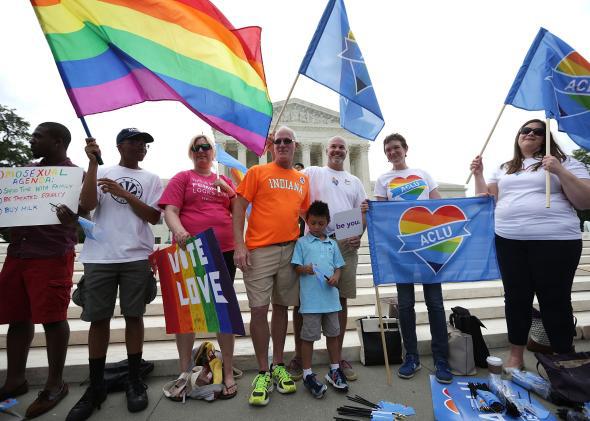Kenji, Dahlia,
Like you, Kenji, I was thrilled to see Justice Anthony Kennedy reject Washington v. Glucksberg’s stingy articulation of fundamental rights under the Due Process Clause. But Dahlia, happy as I am to see Glucksberg chipped away, I would still have preferred a straight Equal Protection ruling. For the rest of our lives, we’ll hear from gay marriage opponents how orotund this opinion is, how hazy its actual legal rationale is. Courts will manipulate it easily—probably in favor of gay rights, but possibly against it. (Remember, one circuit court somehow decided that the equally fuzzy Lawrence v. Texas allowed states to ban gay adoption. To paraphrase Scalia: Really?!)
It didn’t have to be this way. Gay people are an insular and discrete minority who have faced a long history of stigma and prejudice. Under clear Equal Protection jurisprudence, then, laws that disfavor gay people should be subject to heightened scrutiny—perhaps the same level of scrutiny that laws disfavoring women must face. Any state that wishes to ban gay marriage should thus have to show an exceedingly persuasive justification for doing so. If states cannot make that showing—and, spoiler alert, they cannot—their marriage bans must fall. I think that’s a much simpler analysis than inquiring into the “synergy” between Due Process and Equal Protection.
But while I was disappointed to see Equal Protection take a back seat at the core of Kennedy’s holding, I do think it played a substantial role just under the surface of his reasoning. In particular, I think Kennedy was concerned about the Equal Protection rights of the children of gay couples. The court has long held that laws that harm children in order to express moral disapproval of adults’ conduct violate the Equal Protection Clause. (Specifically, the justices invalidated laws that gave “illegitimate” children fewer benefits than “legitimate children” to encourage adults to procreate in wedlock.) Kennedy’s Windsor opinion gestured toward these precedents, noting that the federal gay marriage ban “humiliates tens of thousands of children now being raised by same-sex couples.”
But children take a much bigger role in his Obergefell v. Hodges opinion. Kennedy writes that one basis to protect “the right to marry is that it safeguards children and families” and “affords the permanency and stability important to children’s best interests.” He then pens this remarkable passage:
As all parties agree, many same-sex couples provide loving and nurturing homes to their children, whether biological or adopted. And hundreds of thousands of children are presently being raised by such couples. Most States have allowed gays and lesbians to adopt, either as individuals or as couples, and many adopted and foster children have same-sex parents. This provides powerful confirmation from the law itself that gays and lesbians can create loving, supportive families.
Excluding same-sex couples from marriage thus conflicts with a central premise of the right to marry. Without the recognition, stability, and predictability marriage offers, their children suffer the stigma of knowing their families are somehow lesser. They also suffer the significant material costs of being raised by unmarried parents, relegated through no fault of their own to a more difficult and uncertain family life. The marriage laws at issue here thus harm and humiliate the children of same-sex couples.
Obviously, Kennedy’s decision is based squarely on the Due Process and Equal Protection rights of gay couples themselves. But he weaves the rights of children through his opinion at its most crucial points, linking their own right to equality with the liberty of their parents.
Judge Posner, I wonder if Kennedy’s concern for children in Obergefell sounds familiar to you. The Supreme Court, of course, ultimately declined to hear an appeal to the marriage equality case you decided. But your opinion seemed to shift the judicial debate about same-sex marriage, forcefully refocusing it on the children of gay couples. Kennedy’s vote appeared surprisingly uncertain during oral arguments. Do you think the children ultimately pulled Kennedy over to the side of equality?
Read the previous entry by Dahlia Lithwick. Read the next entry by Richard A. Posner.
Read more of Slate’s coverage of same-sex marriage at the Supreme Court.
